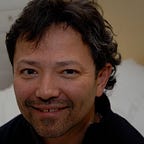The Power of Becoming
And the negation of nihilism.
Modes of Existence
When Gilles Deleuze refers to the pure intensity that is human life, he is addressing what is the Being of life, which for him is process, becoming, difference-in-itself.
For Deleuze, ethics and ontology are different perspectives on the same question: to ask how a mode of existence might be evaluated is to ask what is that mode of existence in itself.
To ask how beings might relate to one another immanently is one and the same as asking what is the relation of beings to Being.
Spinoza didn’t entitle his book Ontology, he’s too shrewd for that, he entitles it Ethics. Which is a way of saying that, whatever the importance of my speculative propositions may be, you can only judge them at the level of the ethics that they envelope or imply [impliquer]. (Sur Spinoza, Cours Vincennes)
Difference-in-itself implies and affirms an immanent ethics in which modes of existence are evaluated by the intensity of their power, the manner in which they occupy their existence.
To Affirm the Power of Acting
Modes of existence that affirm the univocity of Being, and the process of becoming that is life, are good. Modes of existence that negate the powers that express the creativity of becoming are bad.
An ethics of immanence counters anything that separates a mode of existence from its power of acting, of transforming life.
Transcendence separates a mode of existence from its power of acting: to judge life from the perspective of principles external to life leads only to slavery to those principles. Transcendence encourages micro-fascism: it causes us to desire the things that dominate and exploit us, and to fight for our own servitude.
Cut off from our immanent powers, we come to believe that transcendent values are our salvation, when in fact they are the source of our servitude.
Being and Becoming as One
Spinoza’s expressionism and Nietzsche’s will to power, both based on forces that create and transform life, rely on the notion that there is no dualism between being and becoming based on the primacy of identity over difference.
There is only a univocal field of difference in a process of becoming. Life itself, then, is the power to create difference, and ethics is an evaluation of a mode of life to fulfill its ability to experiment, transform, create.
The ethical is the affirmation of life as becoming.
Transvaluation of Nihilism
The eternal return is the return of the will to power, the return of pure difference. Active forces are selected and reactive forces are transformed, transvaluated.
Nihilism, taken to its limit, negates itself, leaving only the will to power. The return of the will to power signals the being of becoming, the affirmation of difference. And an ethics of affirmation sets life free once again, free to create new values.
When we affirm the forces of difference and the power of becoming within and without, we become one with life itself.
Desire as Flow
When we release judgement and the forces that negate life, we are able to experience life as open and new, and participate in its flow of experimentation and creativity. We are able to intuit the virtual power of becoming that overflows this world.
When we act such that the will to power is affirmed in us, we become one with an ethic of transformation.
We have the innate ability to do so. As actualities, we can tap into the virtual forces of which we are constituted. We naturally have the desire to affirm life, to affirm becoming.
Desire is the key to tapping into the virtual and exercising our powers to create and produce.
Desire, a new perspective on desire, is the key to living a life of fulfillment.
I hope you enjoyed this article. Thanks for reading!
Tomas
Please join my email list here or email me at tomas@tomasbyrne.com.
Excerpt from my forthcoming book, Becoming: A Life of Pure Difference (Gilles Deleuze and the Philosophy of the New) Copyright © 2021 by Tomas Byrne. Learn more here.
